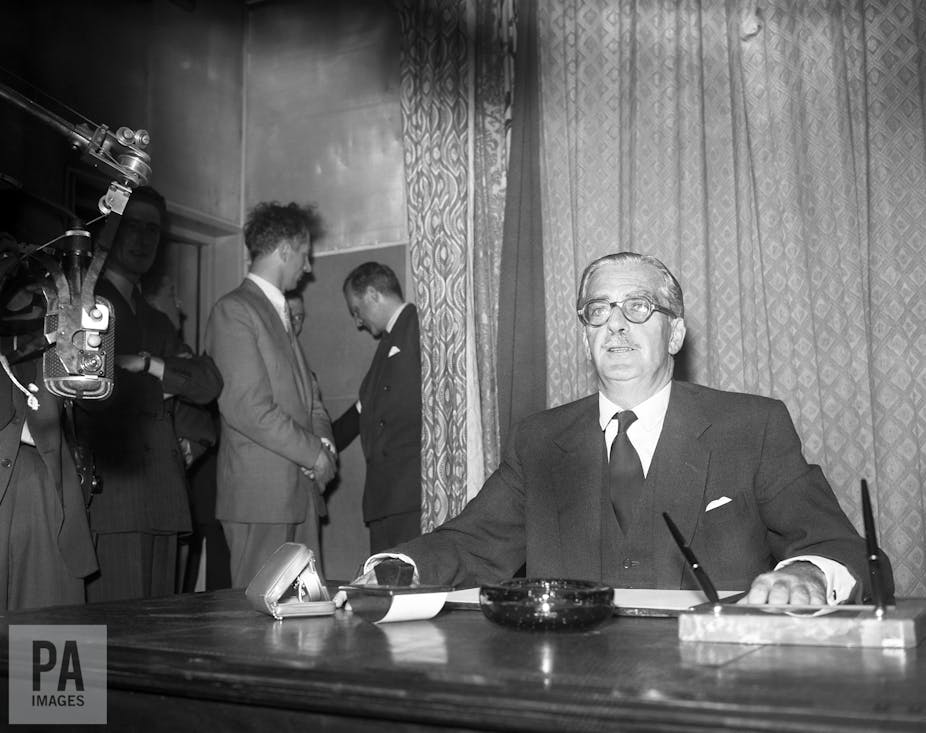By a delicious irony, UK prime minister Anthony Eden’s disastrous Suez adventure in 1956 coincided with the withdrawal from publication of Sir John Seeley’s classic text of British imperialism, The Expansion of England. Based on a set of lectures he had given at Cambridge, Seeley’s 1882 text was the first attempt to provide a theoretical basis for British expansion and it included the famous claim that the British appeared to have gained an empire “in a fit of absence of mind”. How appropriate it seems, then, that Eden seemed in 1956 to have sealed the fate of that empire in a similar fit of absent-mindedness.
Rather like the “moment of madness” that otherwise law-abiding people describe when arrested for an out-of-character breach of the law, Eden’s invasion of Egypt can seem to be the result of a lapse of concentration on a genuinely imperial scale. It’s as if he momentarily forgot he was living in the post-war world of superpowers and atomic weapons and somehow imagined he was Lord Palmerston, the Victorian gunboat diplomatist who did indeed once send a fleet of gunboats to bring a recalcitrant Egyptian ruler to heel.
Interpreted as the disastrous doddering of an imperialist daydreamer, Suez can seem like a fitting epitaph to an empire that was already hastening towards an inglorious end.
That interpretation makes for good exam questions, such: “To what extent was Suez a turning point in the story of British imperialism?” But this is not the only way of looking at it. Far from being an embarrassing throwback to Victorian days – and a revelation of how out of touch Eden was with the modern world – Suez might be better understood as a model for a pattern of liberal interventionism that has grown in scale and frequency in the 60 years since 1956, though with a depressingly similar litany of disastrous results.
Reponding to a ‘new Hitler’
The key lies in taking Eden’s reasoning more seriously. He saw Nasser as a new incarnation of Hitler and the nationalising of the Suez Canal as the equivalent of Hitler’s remilitarisation of the German Rhineland 20 years earlier. Historians tend to take this as evidence of Eden’s lack of grip on reality, but his judgement was not so very different from that of others – both before and since.

Gladstone took a similar view of the Egyptian nationalist leader Arabi Bey, whose anti-foreigner uprising prompted the 1882 invasion that established British control in Egypt in the first place. Mrs Thatcher made overt comparisons with Chamberlain’s appeasement of Hitler in denouncing the Argentinian invasion of the Falkland Islands in 1982.
Of course, it’s common practice for leaders to denounce their opponents as criminals or terrorists – and equally common for journalists and academics to ridicule the comparisons. But Eden’s claim merits more serious consideration, not because it was precise – historical comparisons can never be that – but because it set the tone for modern liberal interventionism.
Nasser’s nationalisation of the canal may seem justifiable and even reasonable to modern eyes. But it was nevertheless of highly debatable legality in international law. Similarly, Hitler’s remilitarisation of the Rhineland in 1936 seemed perfectly reasonable to many, especially as the Treaty of Versailles which he was breaking was widely regarded as far too draconian. The French, who had insisted on the demilitarised zone in the first place, were regarded in London and Washington as taking far too aggressive and self-interested a tone in their relations with Germany – very like Eden and Egypt, in fact.
Nor was Eden alone in seeing Nasser as a new Hitler – to the Israelis, whose invasion of Sinai actually precipitated the crisis – he represented a danger to their new state every bit as hostile and dangerous as Hitler’s regime had been.
Judgement call
The questionable nature of Eden’s judgement was not in the comparison he drew but in his decision about what to do about it – and in this he proved not so much backward-looking as prescient. His belief that the dictatorial nature of actions by a foreign leader can justify military intervention has since proved to be the justification of choice for a succession of Western democratic leaders.

These have included American intervention in Nicaragua, Granada and Somalia, NATO’s bombing of Kosovo, British intervention in Sierra Leone in 2000 and more recent western military involvement in Afghanistan, Iraq and now Syria.
Eden’s absolute belief in the rightness of his cause led him to concoct a dishonest conspiracy to overthrow Nasser. His big mistake, however, was not his dishonesty but his failure to involve the Americans. His reasoning was not so different from American reasoning over regime change in Iraq, or even involvement in Vietnam. Instead of condemning Eden for misjudgement and living in the past, we should take more note of his face staring back at us in the political mirror.

